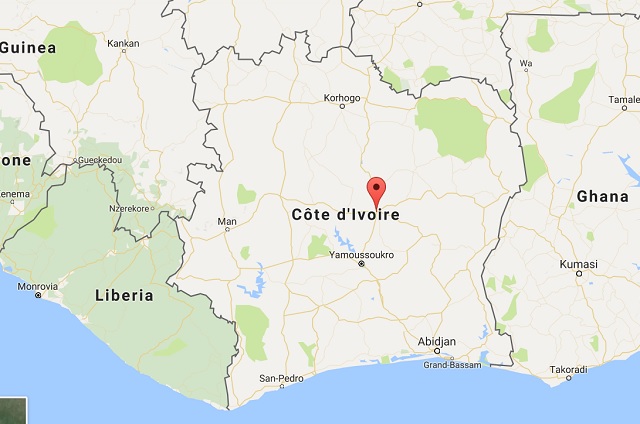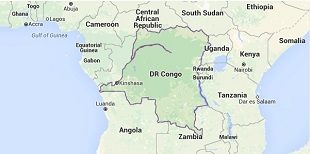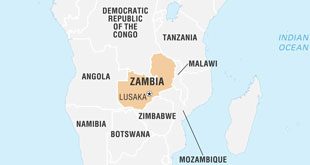
Bouaké, Ivory Coast | AFP |
Mutinous soldiers were holding Ivory Coast’s Defence Minister Alain Richard Donwahi on Saturday, rejecting the terms of a deal announced by the president to end their mutinous pay protest.
An AFP correspondent reported that soldiers were firing Kalashnikov rifles and heavy weapons outside local government offices in Bouake, blocking the minister and his team from exiting talks to defuse the crisis sparked by troops’ takeover of Ivory Coast’s second city on Friday.
The standoff came shortly after President Alassane Ouattara announced that the government and mutineers had reached an agreement, with tensions escalating in the world’s biggest cocoa producer as the unrest spread to the economic capital Abidjan and several other towns.
Shots had rung out at a military base in Abidjan on Saturday as soldiers put up barricades in the city, a day after troops took over Bouake where they terrified residents by firing rocket launchers in the streets.
The soldiers are seeking bonuses, pay rises, housing and faster promotion.
Bouake was the headquarters of an armed rebellion that broke out in 2002 and split the west African country in two until 2011, sparking a decade of clashes and crises.
The current mutiny appears to have been spearheaded by former rebel fighters who have now been integrated into the army.
– ‘Panic’ –
Ouattara did not give details of the deal offered to the mutineers, saying in his brief televised announcement that it took into account “the demands relating to bonuses and improving the living conditions of soldiers”.
“Having given my agreement, I ask all soldiers to go back to their barracks to allow decisions to be carried out calmly,” he added.
Soldiers in Bouake appeared furious after the announcement, with one mutineer saying: “The president must tell us the date we will be paid and the amount we will be given.”
In Abidjan — the bustling commercial hub that is home to the presidency, government and parliament — national television reported earlier that shots had been fired at the Akouedo barracks in the city’s north.
Troops closed off a major junction nearby, leaving the surrounding roads gridlocked and hampering access to several districts.
“The soldiers stopped at the roundabout in front of the barracks, demanding that drivers do a U-turn. This created a panic,” a local journalist told AFP.
“All the shops in the area are closed. The soldiers are wearing balaclavas.”
AFP journalists reported that troops had also put up barricades near a fire station in central Abidjan, where a dozen armed soldiers were forcing cars to turn back.
– All-night shooting –
The rattle of automatic gunfire had raged in Bouake into Saturday, with sporadic shooting still heard by the afternoon, AFP journalists said. Schools and businesses remained shut.
The unrest erupted in Bouake in the early hours of Friday when troops broke into a weapons depot, arming themselves with rocket-launchers and other weapons mounted on pickup trucks before attacking police posts, manning strategic junctions and putting up barricades.
Soldiers also took to the streets of Daloa and Daoukro in the country’s centre as well as Korhogo and Odienne in the north on Friday. Though the protests there eased, the unrest had spread to Man in the west as well as Abidjan by Saturday.
“Most garrisons in the country where there are ex-rebels have risen up, shooting in the air and looting in some places,” a military source said, adding that better-equipped loyalist units, such as the special forces, had not joined the mutiny.
– ‘Emerging from crisis’ –
Donwahi had said in a televised address before heading to Bouake on Saturday that the situation was “understandable but regrettable”.
“We are emerging from a crisis and our army is being rebuilt,” the defence minister said.
“Things are not moving as quickly as we hoped but they are moving none the less.”
A similar dispute over pay by rebels-turned-soldiers erupted in Bouake in November 2014 which spread to Abidjan and briefly brought the country to a standstill.
Bouake was the capital of a rebellion which erupted in 2002 in a failed attempt to oust then president Laurent Gbagbo.
The effective partitioning of the country between a rebel-held north and a loyalist south triggered years of unrest. Rebel forces generally backed Ouattara, the current president who took office in April 2011 after a bloody post-electoral showdown with Gbagbo that left 3,000 people dead.
Gbagbo was arrested and turned over to the International Criminal Court in The Hague, where his trial began in January last year for crimes against humanity.
 The Independent Uganda: You get the Truth we Pay the Price
The Independent Uganda: You get the Truth we Pay the Price


